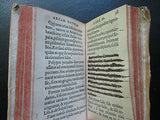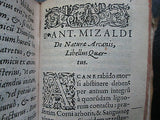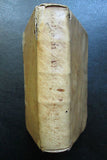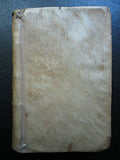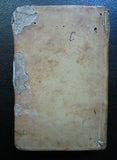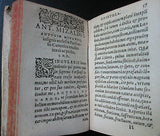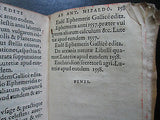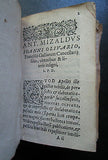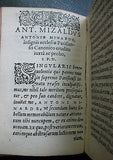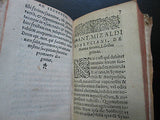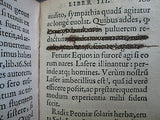FULL TITLE: DE ARCANIS NATURAE, LIBELLI QUATUOR (ABOUT THE SECRETS OF NATURE IN 4 BOOKS) BY ANTOINE MIZAULD
Published by Jacques Kerver. Paris, 1558
Language: Latin
DESCRIPTION:
Rare French renaissance book about the arcane secrets of nature written by the 16th century French doctor & astrologer Antoine Mizauld, also known by the name of Mizaldus. This is the first edition, published by Jacques Kerver, Paris, France,1558. Attractively bound in contemporary vellum boards, small 8vo.
Elaborate headers, & end-pieces, beautifully embellished with woodcut initials. Divided into four parts, each about the secret properties of plants & herbs, as well as zoological observations and historical references. Text complete (lacks title-page), written in Latin, partially legible traces of black ink spine titling.
Atoine Mizauld (1510-1578), or Mizaldus, was a world-renowned doctor & amateur astrologer in the time of Copernicus and Nostradamus. Mizaldus felt he was meant for more significant things than healing, and devoted his life to examining the mysteries of nature. Known as a secrets author who published De Arcanis Natruae (1558), along with Memorabilium, ulitium ac jucundorum Centuria IX Arcanorum (1566), Mizaldus was regarded with incredulity, and was esteemed for his rare learning and acumen.
Mizaldus was "(r)epeatedly cited as the source for other books of secrets, including Thomas Lupton's A thousand notable things (1579) and Johann Jacob Wecker’s Eighteen books of the secrets of art and nature (1660)" (Wilson-Floyd 2013). Mizaldus was so well known that he in fact makes an appearance in the Jacobean tragedy The Changeling (1622) by Thomas Middleton and William Rowley. Near the middle of the play--understood as one of the best tragedies of the English Renaissance--one of the principal protagonists, “Beatrice Joanna, discovers a book of secrets in her fiancé Alsemero’s ‘physician closet’”, which unveils a series of receipts to detect the “secrets of others”. Among these receipts, she finds one that tells her:
“‘How to know whether a woman be a maid or not.’:Knowledge of Mizaldus waned moving into the late 17th century due to a reluctance in reprinting his books. For example, an edition of Mizaldus’ collected works was planned in 1688, however, Gabriel Naude pointed out to the bookseller, that Mizaldus had recorded many silly and extravagant things in his books, thereby stopping plans for publication. Though once renowned, his later reputation and repudiations, led to a lack of republications, as a result one can only become acquainted with Mizaldus through the original editions of his work, and most of these have become rare.
|
CONDITION: Good to very good condition; strongly bound in contemporary vellum boards; lacks title-page, otherwise text complete and in good condition; signs of censorship with several passages blotted out (mostly centered on the 3rd book), a few light stains of the vellum boards, partially legible blank-ink spine title.
|












